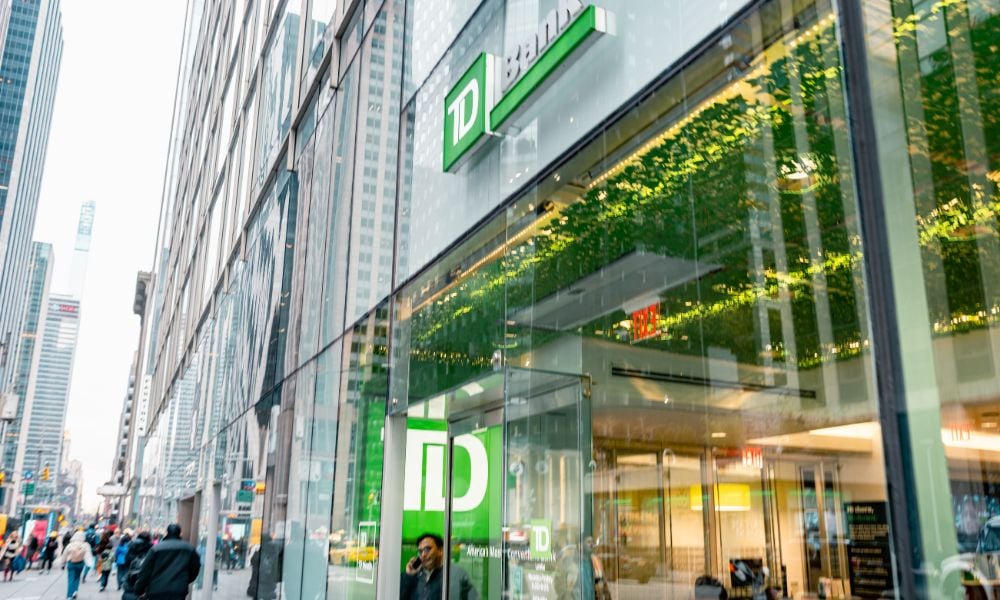Toronto-Dominion's US expansion hits obstacles, leading to underperformance and regulatory scrutiny

Toronto-Dominion Bank's expansion into the US market, intended to drive significant growth, has instead become a financial strain, and damaged the bank's reputation, according to BNN Bloomberg.
The failed US$13.4bn acquisition of First Horizon Corp., alongside a money-laundering investigation into TD's US branches and weak returns from its American operations, have caused concern among investors.
Despite recent improvements, TD's stock has underperformed compared to other major Canadian banks.
TD’s US assets, which include over 10 million customers, contributed around 23 percent of net income and 25 percent of revenue in the most recent quarter. These operations previously enhanced the bank’s stock valuation, but now, some investors are questioning their performance.
Brian Madden, chief investment officer at First Avenue Investment Counsel Inc., noted that the US market is more competitive, less profitable, and involves a more challenging regulatory environment. Madden, once supportive of TD's US growth strategy, now expresses frustration as a shareholder.
With the upcoming Canadian bank earnings season, attention is on TD’s US results and strategy. The bank faces the possibility of billions in fines and potential regulatory restrictions on future US expansion.
A TD spokesperson declined to comment, citing the quiet period before the earnings release.
Scotiabank analyst Meny Grauman pointed out that anti-money laundering (AML) issues continue to overshadow TD's quarterly results.
Grauman sees TD as a value opportunity but warns that any signs of weakness might be “severely punished,” while strong results may not lift share prices due to unresolved AML concerns.
TD executives, however, remain confident in their US business despite regulatory challenges. CEO Bharat Masrani highlighted the division’s substantial growth potential, noting that TD’s US footprint serves three times as many customers as its Canadian operations.
Toronto-Dominion has invested over US$25bn in US acquisitions over the past two decades, a strategy initiated by former CEO Ed Clark.
Major deals include the US$6.3bn acquisition of Chrysler Financial, the US$8.5bn purchase of Commerce Bancorp, and the US$1.3bn acquisition of Cowen Inc. TD’s US operations now rank as the 10th largest bank in the country by assets, with nearly 1,200 branches from Maine to Florida.
The collapse of the 2022 agreement to buy First Horizon, coupled with the money-laundering probe, has raised questions about Masrani's leadership. In response, TD has replaced around 10 senior compliance and legal executives and spent US$367m to strengthen its AML defenses.
Compounding investor concerns is TD's relatively low return on equity (ROE) from its US retail banking operations.
Nigel D’Souza, a senior investment analyst at Veritas Investment Research, calculated that the US retail bank’s ROE was just 8.5 percent in fiscal 2023, compared to 36.8 percent for TD’s Canadian banking division.
D’Souza argued that TD’s US business appears more profitable due to subsidized returns, with some expenses allocated to the bank's general corporate segment.
Over the past year, TD's stock has fallen 3.6 percent, while its five largest Canadian competitors have gained an average of 17 percent. The stock’s underperformance, combined with negative headlines related to the AML investigation, has led some to question Masrani’s leadership.
Nigel D’Souza commented that while a change in leadership might shift investor sentiment, it would not necessarily improve the US banking division's ROE or reduce the competitiveness of the industry.



